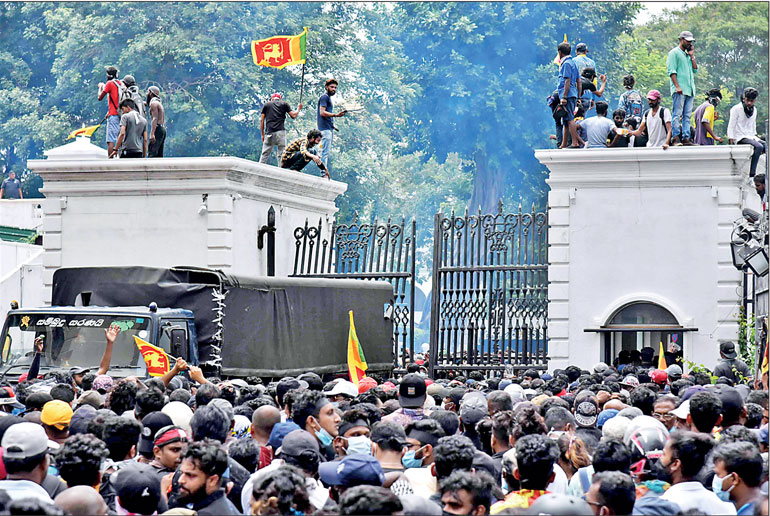Monday Feb 23, 2026
Monday Feb 23, 2026
Thursday, 25 August 2022 00:10 - - {{hitsCtrl.values.hits}}

 During periods of great upheaval, dividing lines between allies and enemies are redrawn. The reaction to the 9 July uprising in Sri Lanka is an example. The polarisation between progressive and reactionary forces has become clearer. But to develop its implications, it helps to insert it into the narrative of universal history, to identify its deeper potential. In this sense, the cunning of reason, to use Hegel’s famous phrase, continues. The spirit of the uprising lives.
During periods of great upheaval, dividing lines between allies and enemies are redrawn. The reaction to the 9 July uprising in Sri Lanka is an example. The polarisation between progressive and reactionary forces has become clearer. But to develop its implications, it helps to insert it into the narrative of universal history, to identify its deeper potential. In this sense, the cunning of reason, to use Hegel’s famous phrase, continues. The spirit of the uprising lives.
What does this mean in practice? It helps to start by comparing with a well-established example. The Concert of Europe, created in 1815 in the aftermath of the French Revolution and the Napoleonic Empire, represented perhaps the most famous modern attempt to try and corral forces of change within the boundaries of national territories. Chief among them were the Holy Alliance including Russia, Austria, and Prussia.
Although they could not ultimately contain the outburst of nationalisms leading, for example, to Italian unification, their efforts were felt in the immediate suppression of popular revolutions in 1848 that built on the legacy of the French Revolution. These rebellions aspired to greater democracy and failed. But they paved the way for the thinking and preparation that ultimately contributed to the rise of the working-class movement that would have a tremendous impact on Europe from the late 19th century onwards.
As Eric Hobsbawm put it in the Age of Capital, the rebels of 1848, specifically the labouring poor, “lacked the organisation, the maturity, the leadership, perhaps most of all the historical conjuncture, to provide a political alternative. Strong enough to make the prospect of social revolution look real and menacing, they were too weak to do more than frighten their enemies.” Yet their insurrection inspired major thinkers, chief among them being Marx and Engels, who would formulate the challenges of taking state power and the need to envision an appropriate collective agency—the proletariat—that could carry out a revolutionary programme of social transformation.
In many ways, Sri Lanka is at the forefront of major global changes. The predominant focus in the international media has been on Sri Lanka’s debt crisis. But there is also breakdown and possible reconfiguration happening in the relationship between state and society that anticipates deeper transformation. It is clear too that in the aftermath of Ranil Wickremesinghe’s installation as President, there is now an obvious attempt to consolidate power—whether through direct suppression or deception—which further leads to the polarisation between reactionary and progressive forces. Yet whatever ambiguity remains is rooted in the haziness of the economic question. Many on both sides still assume the state is coextensive with the economy.
The neoliberal emphasis on the extent to which economic reforms must be undertaken assumes that the state itself is the obstacle. Those who oppose such reforms see the defence of existing public control of economic institutions as critical. My own sympathies are obviously with the latter. And it is obvious that the current wave of repression is preparing the ground for a much sharper program of economic shock therapy, such as privatising the Ceylon Electricity Board (CEB), that will have even more severe distributional consequences. But I would also argue that if we wish to strengthen the democratic opposition forces on the ground, who are under severe threat and persecution, we must also see possible opportunities for offense as well. That means envisioning a broader program of political economic transformation that goes far beyond defending existing state institutions.
Making utopian visions concrete through collective action
For Marx and Engels coming out of the failed Revolutions of 1848, the emerging proletariat in Europe’s industrial centres represented a clear, long-term sociological case for why the working class was the leading edge of the democratic struggle to transform society. Meanwhile, the interpenetration of foreign and domestic politics meant that struggles to defend or resist nationalism reflected clear ideological commitments. Perhaps the most famous (and notorious) was Engels’s problematic line of attack on Slavic nationalism because of its alliances with the repressive powers in Europe.
But radicals such as Marx and Engels also held onto belief in the idea that the working class would eventually be able to unite across countries, to seize the productive forces that had been monopolised by the bourgeoisie, and to unleash a social transformation unprecedented in human history. In the case of Sri Lanka today, it almost seems as if the left both does not and cannot have the same ambitions. Sri Lanka is a peripheral country caught up in the crosscurrents of the manoeuvring of powerful global actors. In addition, the economic depression is forcing the country to stay focused on survival rather than any type of utopian vision.
Yet even in the gravest circumstances, we can discern the potential lines of progressive struggle that could shake the foundations of the political economic order. The key is raising as a theoretical question the relationship between the state and the constituent units of economic life that must be mobilised to revive production and demand. To solve the economic crisis requires an element of utopianism. In contrast, the economic program of the current Government is a non-starter. The idea that Sri Lanka can re-enter global financial markets by trying to privatise as much as possible reflects the impoverished imagination of an ideology rooted in the defunct understanding of growth and foreign investment that neoliberal globalisation promised.
Instead, the stresses on supply chains and tremors in the contemporary global economy anticipate a turbulent period ahead. Beliefs in “comparative advantage” and economic integration as pure, unadulterated priorities are increasingly being questioned, especially in the hegemonic centres of power themselves. The populist backlash in the global North is far from over. And the establishment over there is increasingly beginning to take seriously the need to a shift toward what Dani Rodrik among others call “productivism,” in which critical strategic industries take priority and require sustained investment, and possibly even planning, by the state.
We can be sanguine about the ongoing challenges of redistribution, and whether these will manifest in changes that empower the working classes in those countries. But they do indicate a sharp break with some key assumptions of neoliberal globalisation.
Hope as a critical element in resistance
In either case, the macro direction is becoming clearer. Inter-imperialist rivalries are intensifying. It is a question not only of economic but also social survival if Sri Lanka’s political leadership continues to envision the solution in terms of following the old precepts and dogmas, rather than trying to chart a new path. It is the fear of the latter that makes people feel uncertain, and especially in these times of crisis, provokes stronger identification among the middle class and elites with the supposed “stability” represented by an increasingly authoritarian government. Or as Hobsbawm put it in The Age of Capital, in the context of 1848, “The middle classes of Europe were frightened and remained frightened of the people: ‘democracy’ was still believed to be the certain and rapid prelude to ‘socialism.’”
Nevertheless, in comparison, the current government in Sri Lanka is bound to fail if, in addition to lacking a wider social base, it reflects the failed ideology that created the problems in the first place. Wasn’t it the belief in a saviour that enabled Gotabaya’s election? Here Sri Lanka’s establishment is again, praying for respite at the altar of a god that has already proven to be false.
It was, in fact, the stunning revelation of collective agency in the people’s movement that turned out to be the real Prince that could possibly introduce society to higher and more stable foundations. In contrast, if the ongoing crackdown is an example of anything, it is a tight-fisted embrace of the old, while pompously dismissing the vast, revolutionary implications of the new. The goal then must be to broaden the scope of that movement and to take into consideration the entire economy, beyond the narrow piece of it supposedly monopolised by the state. Far from the socialist state having secured the commanding heights, if the neoliberals truly take responsibility for the alleged successes of the open economy, they must by now have realised it is contradictory to argue that state failure, not market failure, is responsible for the current crisis.
Meanwhile, for those invested in an alternative, progressive economic direction, it is true that the entire economy will take more time to transform, such as reconstructing the built environment and designing a more people-friendly infrastructure. But in the meantime, there are concrete steps that can be taken to actively promote those aspects of people’s associational life—from cooperatives to mutual aid societies—that have sprung up or otherwise deepened efforts in response to the crisis.
On a more general level, the battle over budgets and fiscal austerity is a proxy for a deeper debate over social priorities, including the profound dangers of the collapse in demand among working people. The fact that experts are telegraphing re-entering global financial markets as the ultimate vista should be a clear indication of the utterly broken structure that these measures are trying to repair. Any opposition to this supposed reform program must confront it head on then and ask, what is the egalitarian basis on which society must actively be rebuilt? Are people going to accept a society in which most remain on the bare edge of survival, with no hope even in a better future?
While Sri Lanka may be a peripheral actor on a global scale, it is progressive transformation that could mark a much bigger change in the balance of forces; a shift deeper than any gamesmanship and politicking that defines current mainstream attempts to insert the country into a narrative of the geopolitical dominance of one great power or another. And it is here that the true spirit of not only 1848 but all great rebellions can be revived to inspire the thinking that will define generations to come. Taking its place among them, the uprising of 9 July may not have ended in the victory progressives anticipated. But efforts to draw out its lessons and to shift the battle onto a higher plane are not over. This perspective remains embedded in the overwhelming priority to resist the ongoing jailing of activists and attempts in general to divide and conquer the movement.